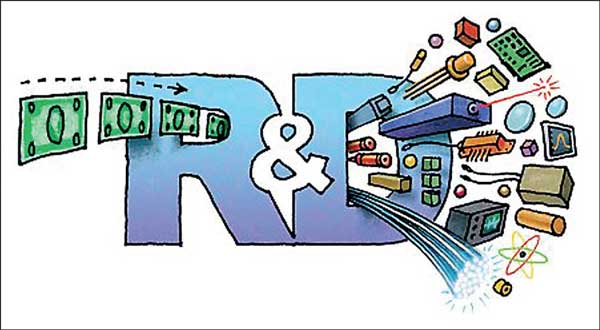16 Jun 2016 - {{hitsCtrl.values.hits}}

The private sector of advanced economies is expected to invest 40 percent more in R&D which will have a positive impact on the GDP growth
 International Monitory Fund (IMF) in the recent study of Fiscal Monitor says that the global recovery is still weak and policy makers have not been able to address the issue effectively, pushing the global economy to more and more risks.
International Monitory Fund (IMF) in the recent study of Fiscal Monitor says that the global recovery is still weak and policy makers have not been able to address the issue effectively, pushing the global economy to more and more risks.
The fiscal policies are expected to address this situation with immediate effect in order to reduce vulnerabilities. Since April 2015 fiscal situations have worsened mainly in middle income economies and emerging markets reaching the levels of previous global financial catastrophe, the situation has pushed public debt ratios upward in these economies.
Oil exporters in Middle East and North Africa would be in difficult situations. The advanced economies also may face vulnerable situations due to low inflation, slow growth, and high public debts. It is understood that bold policy decisions are needed to address this situation, but the political pressure does not allow corrective remedies to take place in most of the major economies.
The key challenges in emerging and developing economies would be to provide budgetary provisions to cater rising demand for public services including health, education and infrastructure.
IMF says oil importing countries with large fuel subsidies can use savings of lower oil prices to support growth-enhancing reforms; at the same time the economies should develop a risk management framework to reduce the high exposure.
Deteriorating monetary trends
The IMF identifies that fiscal positions have worsened during year 2015, with a sharp decline of oil prices and change of investor trends towards emerging and middle income economies.
These situations have resulted in revising debt trails upward in most of the economies. Commodity exporters in emerging and developing economies experienced a considerable decline in their financial positions, where commodity importers have not been able to absorb the benefits of the same.
Whilst advanced economies suffering due to high debt, low inflation, and low growth, decline in commodity prices, slowdown in trade, declining capital inflows to emerging and developing economies were also clearly observable. Trade is still an important source of revenue for emerging and developing economies and this trade slowdown is considerably affecting the fiscal positions of these countries.
Monetary policies to support innovation and growth
In most of the economies, the productivity and innovation have become the key agenda and fiscal policies are aligned to support this process. The fiscal policies will inspire Research & Development (R&D), Entrepreneurship and Technology Transfer.
The private sector of advanced economies is expected to invest 40 percent more in R&D which will have a positive impact on the GDP growth.
It will have a positive impact on the global economy by way of spillover effect. Most of the firms find it difficult to find finances for the R&D investments due to the fact that R&D involves high risks and returns could be expected only in the mid or long term.
During recession eras, R&D funding will have a negative outlook since more attention should be paid to liquidity risks and reducing business cycle instability. It is noted that returns to private R&D are higher in advanced economies compared to emerging and developing economies. However, the returns depend on human capital base of those countries, if the workforce is educated and has the capacity to absorb technological advances.
China is a good example for high return on R&D efforts. Private R&D investments may positively affect the other firms in the industry and through spillover effect and it could be further extended to other industries as well. So, corrective Fiscal Instruments should be used to avoid any under investments in R&D.In other words firms should be encouraged by offeringtax credits and direct subsidies ect. The IMF report suggests that Increasing private R&D could generate a significant growth dividend for the economy. It is estimated that boosting 40% of R&D investments may bring in approx. 5% GDP growth in the longrun.
It is with a positive note that IMF expresses the importance of international R&D spillovers which will affect the global economy positively. For example R&D investments taking place in the G7 countries are supporting other countries to increase productivity. The European Union is also planning to increase private R&D by 2 percent of GDP by 2020 which it is a 50 percent increase.
Encouraging technology transfer
It is noteworthy that more than 60 percent of the global R&D is taking place in G7 countries and absorbed in to other emerging and developing economies.
It is through international trade and Foreign Direct Investments (FDI) that technology be transferred. Businesses can obtain technological knowledge by importing technically-advanced capital equipment and intermediate goods or learn by importing technologically advanced products. It is a known fact that through FDIs too latest technology is being distributed. Multinationals generally spill it over to their afflicted firms abroad. Other firms in the receiving economies are also having the advantage of through the industry spillover as mentioned above.
Adapting tax policy to attract FDI
It is the practice of emerging and developing economies, setting up investment zones to attract FDIs and introduce tax holidays where the economy can get the best benefit by having high quality jobs, high productivity and much needed investment funding.
It is a question whether these benefits are grinded down by Corporate Income Tax bases. The studies conducted in Africa Asia and Latin America reveals that tax incentivesofferedhave very little impacton investment decisions of multinationals. Attracting FDIs to emerging and developing economies have other concerns such as Institutional quality, knowledge and infrastructure.
Promoting entrepreneurship
As per the IMF report, it is not only the large companies that should invest in R&D, but also the small startups that should engaged in experimentation and risk taking. It is a known fact that large firms would tend to look at incremental development of their innovations, whereas startups are more radical in technical innovations and make the environment more competitive.
The way entrepreneurship taking place is different from country to country. The report says, in fourteen EU countries, there is decline of new businesses entering the market after the recession, where 11 countries record positive results. A decline is visible in US as well. In emerging and developing economies new business entries are higher, but more driven by necessity not by innovation. So it is very important to ensure institutional support for business entry growth and exit as well. Access to finance is one key issues faced by entrepreneurship, where the support can be extended through seed capital, early stage financing and venture capital etc. Other issues that are affecting the entrepreneurship, are considered non fiscal : Permits, licenses, bankruptcy laws and unfavorable labor laws. There is a tendency that more startups could erupt as personal business entities, not as corporates where Personal Income Tax (PIT) may play an important role. Most of the PIT systems have given limited facilities to offset losses and it might work as a discouraging characteristic for startups.
IMF recommendations
To ensure productivity growth and to promote innovations, it is vital to pay attention to following aspects through fiscal policies. Promoting R&D will be a key aspect for the economy and even through recessions, firms should be able to keep on spending for R&D activities.
The expectations from the governments are also of great significance and it reiterates the fact that pushing 40 percent more on R&D investments in advanced economies will have an impact of 5 percent of GDP growth in the long run. This will certainly bring positive impact on other economies through spillover effect.While designing fiscal incentives to support private R&D, governments are supposed to spend more on public R&D such as scientific research that would facilitate more towards the private sector R&D.
The emerging and developing economies are saddled with a challenge of absorbing technology in to the economy, and all possible steps should be taken to attract FDIs. These countries are expected align policies to have better institutions, education and infrastructure and improving human capital base is also of paramount importance.Further more tax preferences should be targeting the new firms entering the business promoting entrepreneurship.
Reference- IMF Fiscal Monitor April 2016
(Writer is the Secretary General / CEO of the National Chamber of Commerce of Sri Lanka)
10 Jan 2025 1 hours ago
10 Jan 2025 2 hours ago
10 Jan 2025 4 hours ago
10 Jan 2025 4 hours ago
10 Jan 2025 4 hours ago